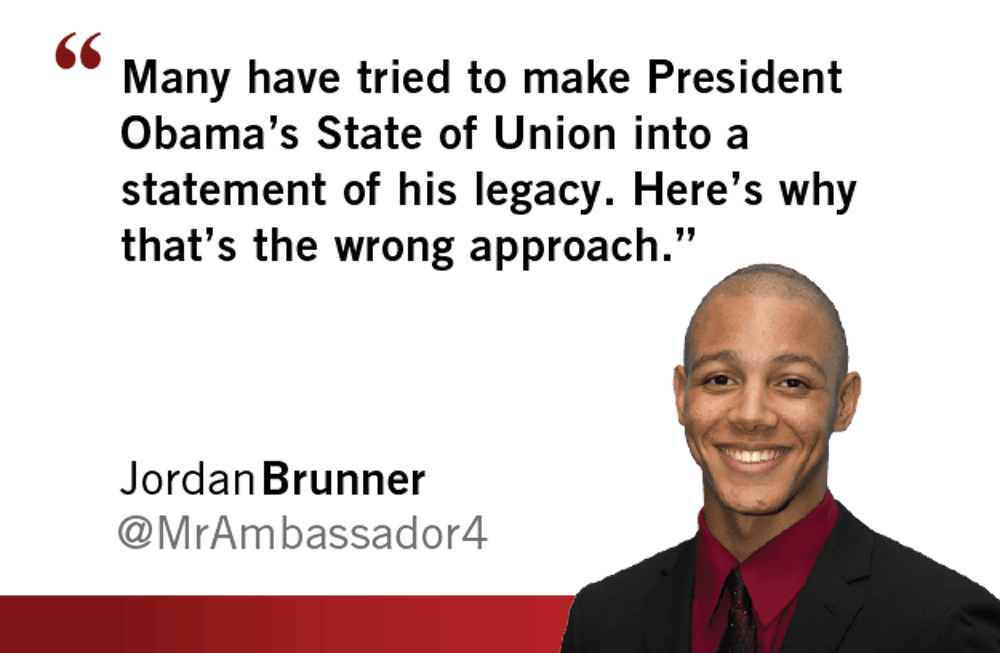“He shall from time to time give to the Congress information of the state of the union, and recommend to their consideration such measures as he shall judge necessary and expedient…” This is how Article II, Section 3 of the U.S. Constitution describes the event that took place on Monday night that was broadcast on TV sets and computer screens across the country. This simple clause has spawned an entire season of political activity and projection of power by both the president and by Congress in order to reach the American people regarding how they think the country should be run.
There is something else that this address has spawned besides projections of power: projections of legacy. As of late, there has been a great deal of speculation about what was said in the State of the Union in hopes that it might reveal how Obama wants people to view his legacy. In a sense, this is not a bad strategy. After all, the president did highlight many aspects of both foreign and domestic policy that he has not dealt with in recent years, including cyber security, paid sick leave, free community college and intelligence and drone strike reform — among other things. These are aspects of his presidency that will leave long-lasting impressions on the nation and might even require executive action on his part with the current state of Congress.
However, this line of reasoning has a few serious flaws in it, and is largely misguided. In the first place, this assumes that the issues that are highlighted in Obama’s speech will remain pre-eminent issues. We all know that with the changing nature of the world, this is often not the case. Within a few months, issues ranging from cyber-security to terrorism; Russian aggression; a global outbreak of Ebola; police brutality and still-existent racism have all popped up unexpectedly, causing the administration to switch from its main focus on health care and the economy to the issues highlighted above. The same scenario will most likely play out in the last two years of Obama’s second term, as the nature of the world and the U.S. continues to change and evolve.
The second serious flaw in this line of thinking is that it encourages people to forget all that has been done in favor of focusing only on the issues at hand. While it is good to look forward, the State of the Union is also a time of reflection, which Obama engaged in quite a bit in demonstrating how far this country has come since he took office, and since the start of the new century.
Too often, we are quick to focus on the issues at hand rather than the larger picture of where this country is going, which is what Obama has been trying to do all along. In fact, little was different in Obama’s State of the Union in looking at his focus in the past. Rather, this was more an update for the current situation. In fact, as President Obama himself said: “My only agenda for the next two years is the same as the one I've had since the day I swore an oath on the steps of this Capitol — to do what I believe is best for America.”
We should look at the State of the Union for what it is rather than for what we want it to be. The State of the Union is not Obama’s vision of what issues he wants to determine his legacy, but rather how he sees this country at the present moment (“the State of the Union is strong”) and how he plans to maintain the strength he believes it possesses.
Many of the ideas that he put forward I believe should be implemented by Congress. I don’t know how far that will go with the present climate. What I do know is that if we want to continue to make the Union better and stronger, we should look less at what Obama is trying to leave behind, and more at what issues he has been trying to emphasize by putting them out front.
Reach the columnist at jbrunne2@asu.edu or follow @MrAmbassador4 on Twitter.
Editor’s note: The opinions presented in this column are the author’s and do not imply any endorsement from The State Press or its editors.
Want to join the conversation? Send an email to opiniondesk.statepress@gmail.com. Keep letters under 300 words and be sure to include your university affiliation. Anonymity will not be granted.
Like The State Press on Facebook and follow @statepress on Twitter.





